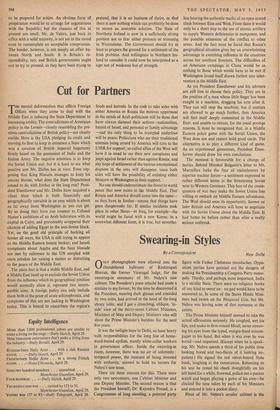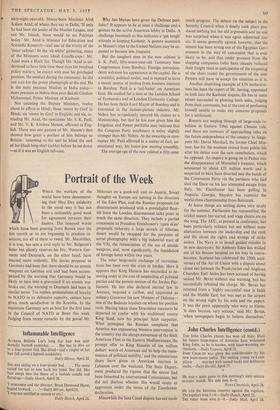Swearing-in Styles
By a Correspondent New Delhi
ONLY photographers were allowed into the chandeliered ballroom of Rashtrapati Bhavan, the former Viceregal lodge, for the swearing-in ceremony of Mr. Nehru's new cabinet. The President's press attaché had made a mistake in my favour; by the time he discovered it the President, wearing dark glasses and attended by two aides, had arrived at the head of the long ebony table; and I got a crouching, oblique, 'in- side view of the thirty-seven Cabinet Ministers, Ministers of State and Deputy Ministers who will share the Prime Minister's burdens for the next five years.
It was the twilight hour in Delhi, an hour heavy with responsibilities for the long line of home- ward-bound cyclists, mostly white-collar workers in government offices. Inside the swearing-in room, however, there was no air of solemnity : temporal power, the moment of being invested with authority, seemed to hold no terrors for Nehru's new team.
There are three reasons for this. There were only two newcomers, one Cabinet Minister and one Deputy Minister. The second reason is that the President himself, Dr. Rajendra Prasad, is a Congressman of lon4 standing, a paternal party figure with Father Christmas moustaches. Oppo- sition parties have pointed out the dangers of making the Presidentship a Congress Party mono- poly. Thirdly, and perhaps most important, India is a secular State. There were no religious books Of any kind to swear on : no god would have to be answered to. In some of the States Hindu Mini- sters had sworn on the Bhagavad Gita, but Mr. Nehru was having none of that nonsense at the centre.
The Prime Minister himself seemed to take the actual affirmation seriously. He coughed, wet his lips, and spoke in firm-voiced Hindi, never remov- ing his eyes from the typed, margin-lined minute- paper in his hand. But when it was over he was bored—and impatient. (Except when he is speak- ing, Mr. Nehru spends a third of his public time looking bored and two-thirds of it looking im- patient.) He signed the red velvet-bound State book, laughing at the cameraman. Returning to his seat he rested his cheek thoughfully on his left hand for a while, frowned, pulled out a pocket watch and began playing a game of his own—he clocked the time taken by each of his Ministers and entered it into a pocket diary.
Pivot of Mr. Nehru's secular cabinet is the sixty-eight-year-old, Mecca-born Maulana Abul Kalam Azad, of whom they say in Delhi, 'If only he had been the leader of the Muslim League, and not Mr. Jinnah, there would be no Pakistan today.' Mr. Azad is Minister for Education and Scientific Research—and one of the trinity of the 'inner cabinet.' In the 'all-white' gathering, many of the Ministers wore khadi Gandhi-caps : Mr. Azad wore a black fez. Though Mr. Azad is un- derstood to have little time these days for involved policy matters, he enjoys with ease his privileged position. He smoked during the ceremony; he did not wait for the group photograph at the end. He is the most precious Muslim in India today— more precious to Nehru than even Bakshi Ghulam Mohammed, Prime Minister of Kashmir.
Not counting the Deputy Ministers, twelve chose to affirm in Hindi; three 'swore by God' in Hindi; six 'swore by God' in English; and six, in- cluding Mr. Azad, the newcomer Mr. S. K. Patil, and Mr. V. K. Krishna Menon, affirmed in Eng- lish. There was one gesture of Mr. Menon's that showed how great a portion of him belongs to Britain : returning to his seat he lifted the end of his khadi long-shirt (jubba) before he sat down —as if it was an English tail-coat. Why has Menon been given the Defence port- folio? It appears to be at once a challenge and a gesture to the active American lobby in Delhi. A challenge inasmuch as this indicates a `get tough' attitude in keeping Kashmir. A gesture inasmuch as Menon's trips to the United Nations may be ex- pected to become less frequent But the toughest man in the new cabinet is S. K. Patil, fifty-seven-year-old Tammany boss Congressman from Bombay. Foreign correspon- dents welcome his appearance in the capital. He is a truthful, political realist, and is reputed to have a steady source of income from business interests in Bombay. Patil is a 'red-baiter' on American lines. He studied for a time at the London School of Economics and at London University College. He has been thrice Lord Mayor of Bombay and is interested in the motion-picture industry. Mr. Nehru has scrupulously ignored his claims to a Ministership, but that he has now given him the Irrigation and Power portfolio may indicate that the Congress Party machinery is today slightly stronger than Mr. Nehru. At the swearing-in cere- money Mr. Patil affirmed in a matter-of-fact, un- emotional way, his boxer-jaw moving smoothly.
The average age of the new cabinet is fifty-nine.











































 Previous page
Previous page